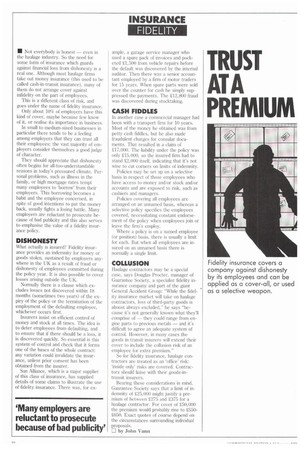TRUST ATA PREMIUM
Page 24

If you've noticed an error in this article please click here to report it so we can fix it.
• Not everybody is honest — even in the haulage industry. So the need for some form of insurance which guards against financial loss from dishonesty is a real one. Although most haulage firms take out money insurance (this used to be called cash-in-transit insurance), many of them do not arrange cover against infidelity on the part of employees.
This is a different class of risk, and goes under the name of fidelity insurance.
Only about 10% of employers have this kind of cover, maybe because few know of it, or realise its importance in business.
In small to medium-sized businesses in particular there tends to be a feeling among employers that they can trust all their employees; the vast majority of employers consider themselves a good judge of character.
They should appreciate that dishonesty often begins for all-too-understandable reasons in today's pressured climate. Personal problems, such as illness in the family, or high mortgage rates tempt many employees to 'borrow' from their employers. This borrowing becomes a habit and the employee concerned, in spite of good intentions to put the money back, usually fights a losing battle. Many employers are reluctant to prosecute because of bad publicity and this also serves to emphasise the value of a fidelity insurance policy.
DISHONESTY
What actually is insured? Fidelity insurance provides an indemnity for money or goods stolen, sustained by employers anywhere in the UK as a result of fraud or dishonesty of employees committed during the policy year. It is also possible to cover losses arising outside the UK.
Normally there is a clause which excludes losses not discovered within 18 months (sometimes two years) of the expiry of the policy or the termination of the employment of the defaulting employee, whichever occurs first.
Insurers insist on efficient control of money and stock at all times. The idea is to deter employees from defaulting, and to ensure that if there should be a loss, it is discovered quickly. So essential is this system of control and check that it forms one of the bases of the whole contract: any variation could invalidate the insurance, unless prior consent has been obtained from the insurer.
Sun Alliance, which is a major supplier of this class of insurance, has supplied details of some claims to illustrate the use of fidelity insurance. There was, for ex
ample, a garage service manager who used a spare pack of invoices and pocketed £1,500 from vehicle repairs before the default was discovered by the internal auditor. Then there was a senior accountant employed by a firm of motor traders for 15 years. When spare parts were sold over the counter for cash he simply suppressed the payments. The £12,800 fraud was discovered during stocktaking.
CASH FIDDLES
In another case a commercial manager had been with a transport firm for 10 years. Most of the money he obtained was from petty cash fiddles, but he also made fraudulent charges for consular documents. That resulted in a claim of £17,000. The liability under the policy was only E15,000, so the insured firm had to stand E2,000 itself, indicating that it's not wise to cut corners on limits of indemnity.
Policies may be set up on a selective basis in respect of those employees who have access to money and;or stock and/or accounts and are exposed to risk, such as cashiers and managers.
Policies covering all employees are arranged on an unnamed basis, whereas a selective policy specifies the employees covered, necessitating constant endorsement of the policy when employees join or leave the firm's employ.
Where a policy is on a named employee (or position) basis, there is usually a limit for each. But when all employees are insured on an unnamed basis there is normally a single limit.
COLLUSION
Haulage contractors may be a special case, says Douglas Procter, manager of Guarantee Society, a specialist fidelity insurance company and part of the giant General Accident Group: "While the fidelity insurance market will take on haulage contractors, loss of third-party goods is almost always excluded," he says "because it's not generally known what they'll comprise of — they could range from engine parts to precious metals — and it's difficult to agree an adequate system of control. However, in many cases the goods in transit insurers will extend their cover to include the collusion risk of an employee for extra premium."
So for fidelity insurance, haulage contractors are treated as an 'office' risk: 'inside only' risks are covered. Contractors should liaise with their goods-intransit insurers.
Bearing these considerations in mind, Guarantee Society says that a limit of indemnity of £25,000 might justify a premium of between £275 and £375 for a haulage contractor. For cover of £50,000 the premium would probably rise to £550£650. Exact quotes of course depend on the circumstances surrounding individual proposals.
LI by John Vann








































































































